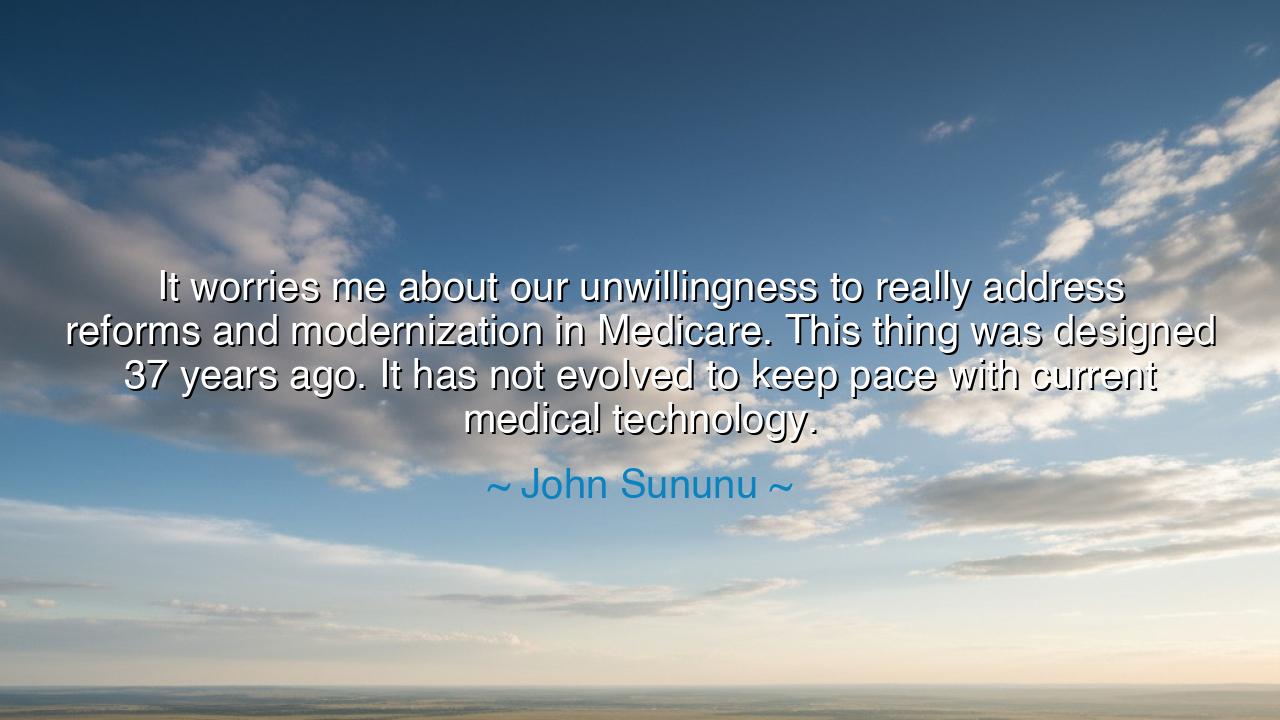
It worries me about our unwillingness to really address reforms
It worries me about our unwillingness to really address reforms and modernization in Medicare. This thing was designed 37 years ago. It has not evolved to keep pace with current medical technology.






In the words of John Sununu we hear a lament that is also a warning: “It worries me about our unwillingness to really address reforms and modernization in Medicare. This thing was designed 37 years ago. It has not evolved to keep pace with current medical technology.” What may appear as a politician’s concern over policy is, in truth, the echo of an ancient truth: that institutions, like living beings, must grow and adapt, or else they wither into obsolescence.
The heart of his cry lies in the recognition that Medicare, conceived in another era, was not fashioned for the age we now inhabit. When it was born, medical knowledge was narrower, technology simpler, and the very expectations of life shorter. Now, however, we dwell in an age where machines peer into the heart, where drugs prolong years once thought impossible, and where the science of healing has advanced in leaps. To carry forth the same system without reform is to place new wine in old skins; it cannot hold, and it will burst.
Sununu speaks of our unwillingness, and here lies a deeper wound. It is not ignorance that imperils us, but resistance to change. Human beings, like nations, cling to what is familiar even when it no longer serves them. History bears witness: the empires of Rome and Byzantium, great in their strength, faltered when they refused to adapt to new conditions, new enemies, new realities. Their reluctance became their downfall. In the same way, Sununu warns that the unwillingness to modernize Medicare is not simply a flaw of governance, but a refusal to heed the law of survival itself.
Consider the example of medicine itself. Once, physicians relied on bleeding and leeches, believing such practices to restore balance. For centuries these methods endured, though they often did more harm than good. It was only when brave reformers challenged tradition and embraced the discoveries of science that medicine became the healing art we know today. In this same spirit, Sununu calls for courage—to let go of what is outdated and to embrace what is necessary, so that the system of care may serve the people as it was meant to.
The deeper meaning is this: technology alone cannot save us if our systems, our laws, and our policies remain chained to the past. What use is a machine that can heal the sick if the people who need it cannot access it? What use is knowledge if the structures designed to deliver it are broken? Progress must not be measured only in invention, but in the wisdom of society to bring those inventions to all. Medicare, as Sununu observes, must not be a relic; it must be a living instrument of compassion and care.
The lesson is plain. We must learn to look at all the institutions in our lives—governments, schools, even families—and ask: Do they still serve the needs of today, or are they bound by the chains of yesterday? To be faithful to the past is noble, but to be imprisoned by it is fatal. True respect for tradition lies not in repeating it unaltered, but in allowing it to grow as times demand. Reform, then, is not betrayal, but fulfillment.
Therefore, let Sununu’s words stand as a call to vigilance. Do not shy away from reform when it is needed, nor from modernization when it is just. Whether in health, in governance, or in personal life, refuse to remain stagnant. For as rivers must flow and trees must grow, so too must the institutions that guard human dignity evolve. In this, the people secure not only their survival, but their honor, ensuring that compassion keeps pace with knowledge, and that the gift of healing remains within reach of all.






AAdministratorAdministrator
Welcome, honored guests. Please leave a comment, we will respond soon